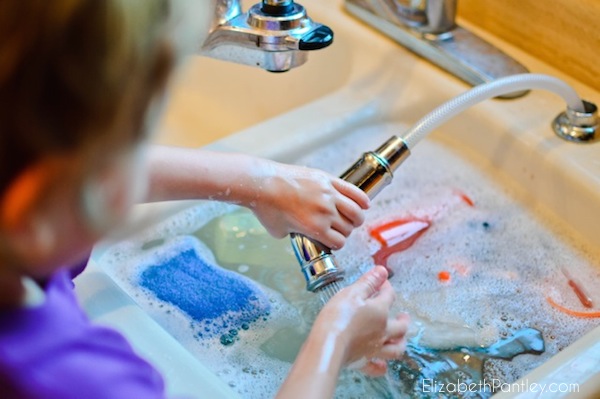
Assigning children household chores is one of the best ways to build self-esteem and a feeling of competence. Regular chores establish helpful habits and good attitudes about work. Having chores also teaches valuable lessons about life and creates an understanding that there are jobs that must be done to run a household. Children who grow up perceiving chores as a normal part of life will find the flow into adulthood much easier than those without responsibility will.
Choose age appropriate jobs for children.
Most parents underestimate their children’s abilities! Keep in mind that a child who has mastered a complicated computer game can easily run the dishwasher! Preschoolers can handle one or two simple daily jobs. Older children can manage two or three daily jobs along with one or two weekly jobs.
Take time for training.
Don’t assume that since your child has seen you do the task a hundred times that she can do it herself. Be very specific in your instruction and demonstrate step-by-step as your child watches. The next step is to let your child help you, followed by your child doing the chore as you supervise. At the point you feel that your child has mastered the job she can take over responsibility for it.
Make a chart.
Children need a visual daily reminder to keep them on track doing chores. A chore chart (try a dry erase board) on which a child can make daily check marks is a helpful way to remind them without you having to nag!
Use the “when/then” technique.
“When your homework is done, then you can play outside.” Or “When your pajamas are on and teeth brushed, then we will read a book.” What makes this idea work is that it’s a simple reminder and adds something to look forward to afterward.
Be very specific in your instructions.
As an example, “clean your room” is vague and can be interpreted in any number of ways. Instead, be clear by saying, “Put your clothes in the closet, books on the shelf, dishes in the kitchen, and toys in the toy box.”
Chore suggestions.
What follows is a list of ideas from which you can choose a few chores for your child. Don’t try to turn your child into Cinderella! Simply review the list, consider your child’s age, ability, and personality, and select chores appropriate for your child. Preschoolers can handle one or two simple jobs. As children get older they can handle a larger quantity of jobs, as well as those that are more complex.
Ages 2 to 3:
Put toys away, fill pet’s food dish, put clothes in hamper, wipe up spills, dust, pile books or magazines, choose clothes and dress self.
Ages 4 to 5:
Above chores plus, make own bed, empty wastebaskets, bring in mail or newspaper, clear table, pull weeds, use hand-held vacuum to pick up crumbs, water flowers, unload utensils from dishwasher, fix bowl of cereal.
Ages 6 to 7:
Above chores plus, sort laundry, sweep floors, handle personal hygiene, set and clear table, help make and pack lunch, weed, rake leaves, keep bedroom tidy, pour own drinks, answer telephone.
Ages 8 to 9:
Above chores plus, load dishwasher, put away groceries, vacuum, help make dinner, make own snacks, wash table after meals, put away own laundry, sew buttons, run own bath, make own breakfast, peel vegetables, cook simple food (such as toast), mop floor, take pet for a walk, pack own suitcase
Ages 10 and up:
Above chores plus, unload dishwasher, fold laundry, clean bathroom, wash windows, wash car, cook simple meal with supervision, do laundry, baby-sit younger siblings (with adult in the home), clean kitchen, change bed, make cookies or cake from box mix, plan birthday party, have neighborhood job - such as pet care or yard work, or have a paper route.
Need more tips? The No-Cry Discipline section of Elizabeth's Blog is filled with practical and easy-to-implement tips!


















































Comments
We have a chart in our home
We have a chart in our home and it has been so helpful for our kids and has proven to work great!
Saturday is our chore and our
Saturday is our chore and our kids all have to get their chores done before they do anything Saturday night.